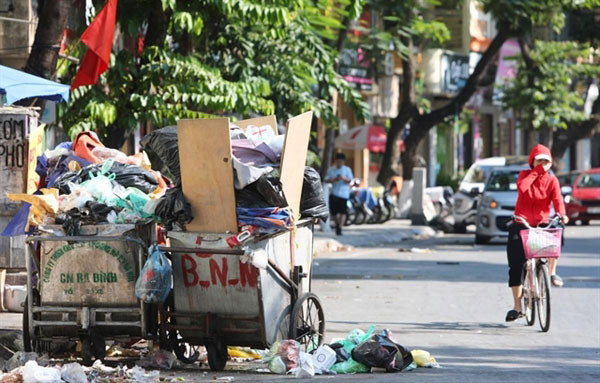
According to the new Government Decree No. 45/2022/NĐ-CP, solid household waste must be sorted and put in trash bags.
The Ministry of Natural Resources and Environment is preparing to collect opinions from localities on guidelines for the classification of domestic solid waste.
Provinces and cities will base on the actual conditions of technical infrastructure and waste treatment technology in their localities to detail the sorting of waste.
The schedule for implementation is no later than December 31, 2024.
By January 1, 2025, domestic solid waste classification is mandatory for all individuals and households.
The new decree states that violations in domestic waste sorting can result in a fine between VND500,000 (US$21.4) and VND1 million (US$42.8).
Representative of the Waste Management Department under the General Department of Environment noted that domestic solid waste is separated based on treatment requirements and into three groups: reusable and recyclable waste; food waste and other domestic solid waste.
Localities can also choose different methods of other waste classification.
Waste collection units are allowed to refuse to collect trash that households and individuals fail to sort and put in packages and notify competent agencies for inspection and handling in accordance with the law.
Currently, waste sorting is only performed in a few major cities. Meanwhile, garbage is not being sorted at the source.
All lumped together, up to 70 per cent of the waste is disposed of by burial.
Regarding garbage collection, waste collection units are struggling to deal with bulky waste while littering is observed to remain common in public areas as a long-standing habit of local dwellers.
Furniture or construction waste is still discharged into the environment, especially in the early morning or late at night, Tin Tức (News) newspaper reported.
People can easily see the bulky waste on many streets of Hanoi such as Tran Nhat Duat, Nguyen Huu Huan in Hoan Kiem District, or on the sidewalks, under bridges in Dong Da and Cau Giay districts.
People even litter in public places, ignoring "No dumping" signs.
Local residents said that many large objects were still lying in places for a few days because the garbage collection unit could not immediately transport them.
Scrap collectors destroy and burn them to get rotten iron and wood, causing serious pollution to the surrounding environment.
Hanoi has issued unit price for treatment of medical waste, and domestic waste but not price for bulky waste, causing difficulties for trash collection units.
A representative of Hanoi Urban Environment One Member Limited Company (URENCO) said bulky waste will be shredded and transferred to Nam Son landfill for burial with domestic waste.
People need to contact the local garbage waste collection unit to deal with bulky waste if they need it, URENCO's representative said.
Assoc. Prof. Dr. Bui Thi An, director of the Institute of Natural Resources, Environment and Community Development, said that local authorities need to arrange bulky waste collecting points and strictly handle violation cases of littering.
Hanoi has 26 waste collection and treatment units. URENCO is in charge of ensuring environmental sanitation of seven out of 30 districts, including Hoan Kiem, Ba Dinh, Hai Ba Trung, Dong Da, Nam Tu Liem, Thanh Oai and My Duc.
Environmental workers have reminded people to dispose of garbage on time and in the right place.
However, illegal littering remains.
Source: Vietnam News